Case Study: Exploring Healing, Autonomy, and Ethical Considerations
VerifiedAdded on 2020/03/04
|6
|1371
|213
Case Study
AI Summary
This case study presents a challenging scenario involving Mike and Joanne, parents of eight-year-old twins, James and Samuel. James suffers from kidney failure (glomerulonephritis) following a strep throat infection. The parents face a critical decision: follow the physician's advice for dialysis and potential kidney transplant or rely on faith healing. The case explores the conflict between medical intervention and religious beliefs, highlighting the ethical considerations of patient autonomy, parental rights, and the physician's responsibility. The analysis delves into the duality of the dilemma, the importance of faith, the role of medical professionals, and the ethical implications of endangering a child's life by withholding necessary medical treatment. The study emphasizes the need for a balanced approach, where faith and medical expertise can work together to ensure the best possible outcome for the patient. The discussion also touches on the limitations of ethical considerations and the importance of communication and collaboration between medical professionals and parents.
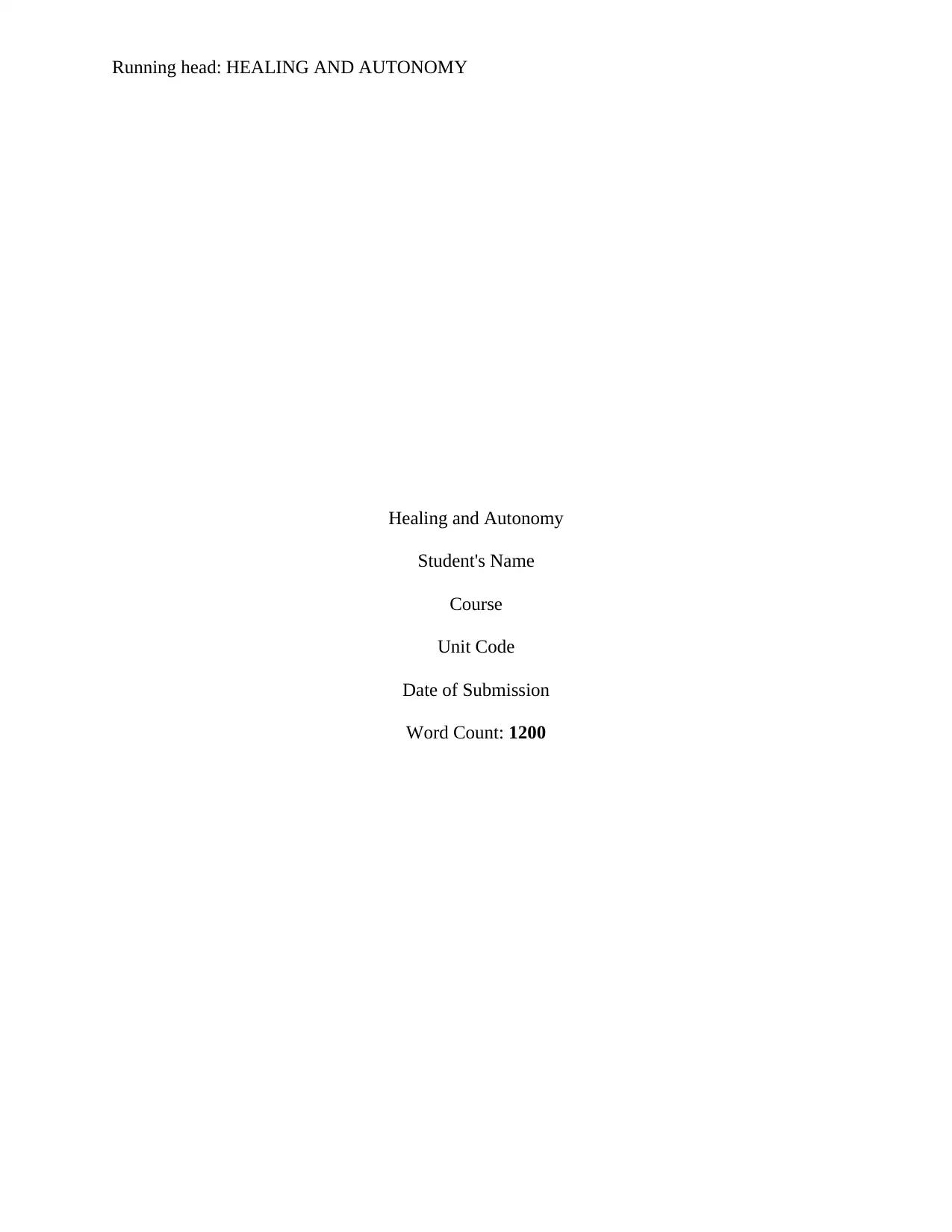
Running head: HEALING AND AUTONOMY
Healing and Autonomy
Student's Name
Course
Unit Code
Date of Submission
Word Count: 1200
Healing and Autonomy
Student's Name
Course
Unit Code
Date of Submission
Word Count: 1200
Paraphrase This Document
Need a fresh take? Get an instant paraphrase of this document with our AI Paraphraser
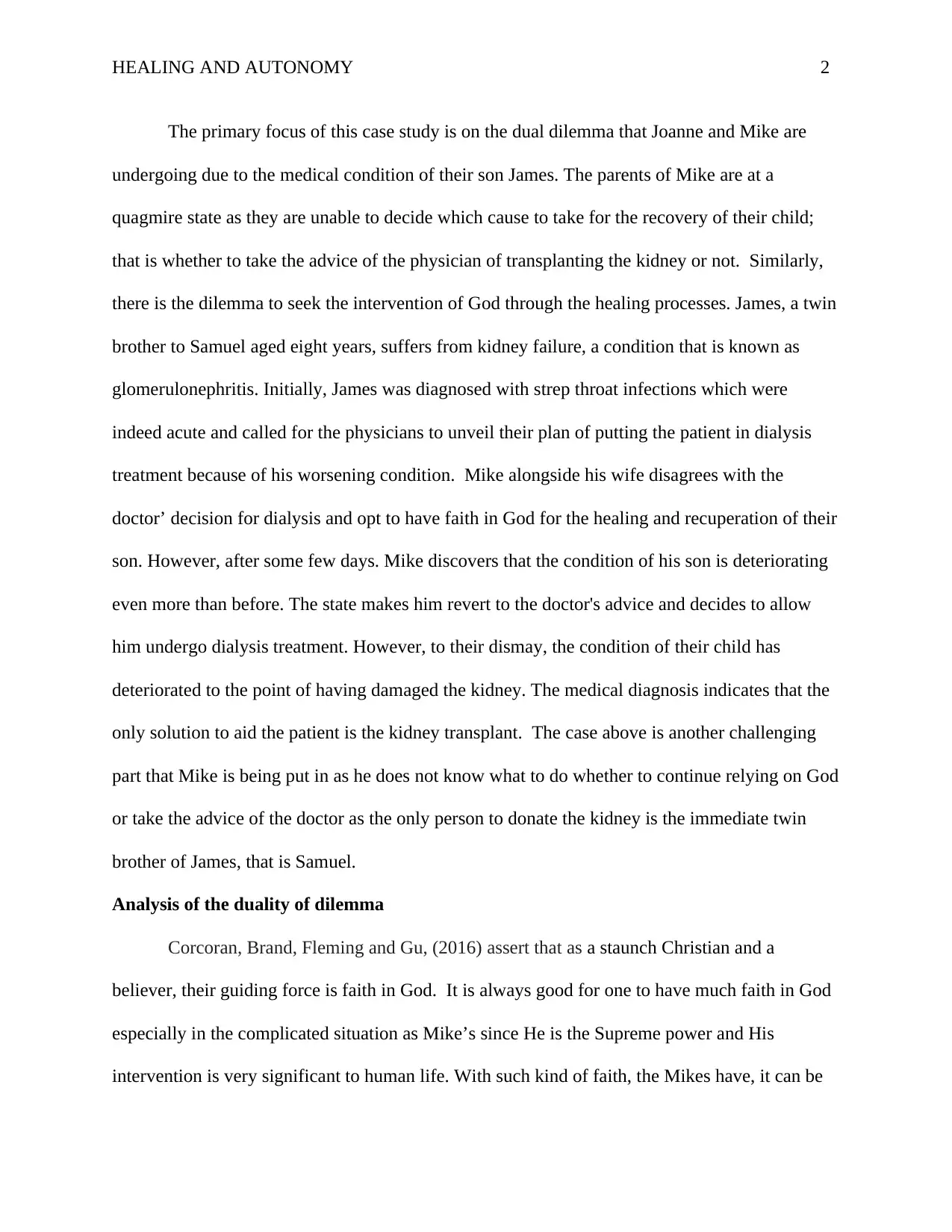
HEALING AND AUTONOMY 2
The primary focus of this case study is on the dual dilemma that Joanne and Mike are
undergoing due to the medical condition of their son James. The parents of Mike are at a
quagmire state as they are unable to decide which cause to take for the recovery of their child;
that is whether to take the advice of the physician of transplanting the kidney or not. Similarly,
there is the dilemma to seek the intervention of God through the healing processes. James, a twin
brother to Samuel aged eight years, suffers from kidney failure, a condition that is known as
glomerulonephritis. Initially, James was diagnosed with strep throat infections which were
indeed acute and called for the physicians to unveil their plan of putting the patient in dialysis
treatment because of his worsening condition. Mike alongside his wife disagrees with the
doctor’ decision for dialysis and opt to have faith in God for the healing and recuperation of their
son. However, after some few days. Mike discovers that the condition of his son is deteriorating
even more than before. The state makes him revert to the doctor's advice and decides to allow
him undergo dialysis treatment. However, to their dismay, the condition of their child has
deteriorated to the point of having damaged the kidney. The medical diagnosis indicates that the
only solution to aid the patient is the kidney transplant. The case above is another challenging
part that Mike is being put in as he does not know what to do whether to continue relying on God
or take the advice of the doctor as the only person to donate the kidney is the immediate twin
brother of James, that is Samuel.
Analysis of the duality of dilemma
Corcoran, Brand, Fleming and Gu, (2016) assert that as a staunch Christian and a
believer, their guiding force is faith in God. It is always good for one to have much faith in God
especially in the complicated situation as Mike’s since He is the Supreme power and His
intervention is very significant to human life. With such kind of faith, the Mikes have, it can be
The primary focus of this case study is on the dual dilemma that Joanne and Mike are
undergoing due to the medical condition of their son James. The parents of Mike are at a
quagmire state as they are unable to decide which cause to take for the recovery of their child;
that is whether to take the advice of the physician of transplanting the kidney or not. Similarly,
there is the dilemma to seek the intervention of God through the healing processes. James, a twin
brother to Samuel aged eight years, suffers from kidney failure, a condition that is known as
glomerulonephritis. Initially, James was diagnosed with strep throat infections which were
indeed acute and called for the physicians to unveil their plan of putting the patient in dialysis
treatment because of his worsening condition. Mike alongside his wife disagrees with the
doctor’ decision for dialysis and opt to have faith in God for the healing and recuperation of their
son. However, after some few days. Mike discovers that the condition of his son is deteriorating
even more than before. The state makes him revert to the doctor's advice and decides to allow
him undergo dialysis treatment. However, to their dismay, the condition of their child has
deteriorated to the point of having damaged the kidney. The medical diagnosis indicates that the
only solution to aid the patient is the kidney transplant. The case above is another challenging
part that Mike is being put in as he does not know what to do whether to continue relying on God
or take the advice of the doctor as the only person to donate the kidney is the immediate twin
brother of James, that is Samuel.
Analysis of the duality of dilemma
Corcoran, Brand, Fleming and Gu, (2016) assert that as a staunch Christian and a
believer, their guiding force is faith in God. It is always good for one to have much faith in God
especially in the complicated situation as Mike’s since He is the Supreme power and His
intervention is very significant to human life. With such kind of faith, the Mikes have, it can be
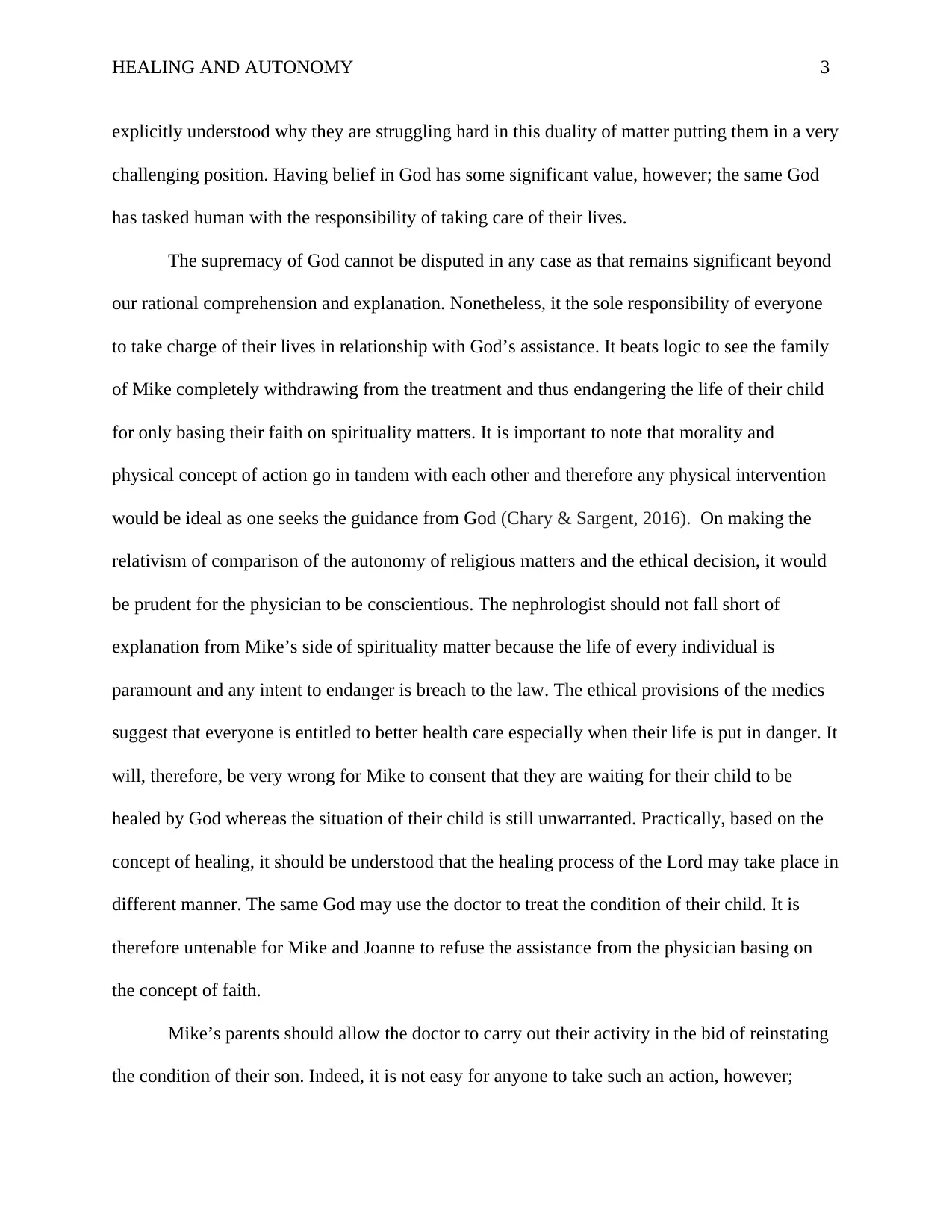
HEALING AND AUTONOMY 3
explicitly understood why they are struggling hard in this duality of matter putting them in a very
challenging position. Having belief in God has some significant value, however; the same God
has tasked human with the responsibility of taking care of their lives.
The supremacy of God cannot be disputed in any case as that remains significant beyond
our rational comprehension and explanation. Nonetheless, it the sole responsibility of everyone
to take charge of their lives in relationship with God’s assistance. It beats logic to see the family
of Mike completely withdrawing from the treatment and thus endangering the life of their child
for only basing their faith on spirituality matters. It is important to note that morality and
physical concept of action go in tandem with each other and therefore any physical intervention
would be ideal as one seeks the guidance from God (Chary & Sargent, 2016). On making the
relativism of comparison of the autonomy of religious matters and the ethical decision, it would
be prudent for the physician to be conscientious. The nephrologist should not fall short of
explanation from Mike’s side of spirituality matter because the life of every individual is
paramount and any intent to endanger is breach to the law. The ethical provisions of the medics
suggest that everyone is entitled to better health care especially when their life is put in danger. It
will, therefore, be very wrong for Mike to consent that they are waiting for their child to be
healed by God whereas the situation of their child is still unwarranted. Practically, based on the
concept of healing, it should be understood that the healing process of the Lord may take place in
different manner. The same God may use the doctor to treat the condition of their child. It is
therefore untenable for Mike and Joanne to refuse the assistance from the physician basing on
the concept of faith.
Mike’s parents should allow the doctor to carry out their activity in the bid of reinstating
the condition of their son. Indeed, it is not easy for anyone to take such an action, however;
explicitly understood why they are struggling hard in this duality of matter putting them in a very
challenging position. Having belief in God has some significant value, however; the same God
has tasked human with the responsibility of taking care of their lives.
The supremacy of God cannot be disputed in any case as that remains significant beyond
our rational comprehension and explanation. Nonetheless, it the sole responsibility of everyone
to take charge of their lives in relationship with God’s assistance. It beats logic to see the family
of Mike completely withdrawing from the treatment and thus endangering the life of their child
for only basing their faith on spirituality matters. It is important to note that morality and
physical concept of action go in tandem with each other and therefore any physical intervention
would be ideal as one seeks the guidance from God (Chary & Sargent, 2016). On making the
relativism of comparison of the autonomy of religious matters and the ethical decision, it would
be prudent for the physician to be conscientious. The nephrologist should not fall short of
explanation from Mike’s side of spirituality matter because the life of every individual is
paramount and any intent to endanger is breach to the law. The ethical provisions of the medics
suggest that everyone is entitled to better health care especially when their life is put in danger. It
will, therefore, be very wrong for Mike to consent that they are waiting for their child to be
healed by God whereas the situation of their child is still unwarranted. Practically, based on the
concept of healing, it should be understood that the healing process of the Lord may take place in
different manner. The same God may use the doctor to treat the condition of their child. It is
therefore untenable for Mike and Joanne to refuse the assistance from the physician basing on
the concept of faith.
Mike’s parents should allow the doctor to carry out their activity in the bid of reinstating
the condition of their son. Indeed, it is not easy for anyone to take such an action, however;
⊘ This is a preview!⊘
Do you want full access?
Subscribe today to unlock all pages.

Trusted by 1+ million students worldwide
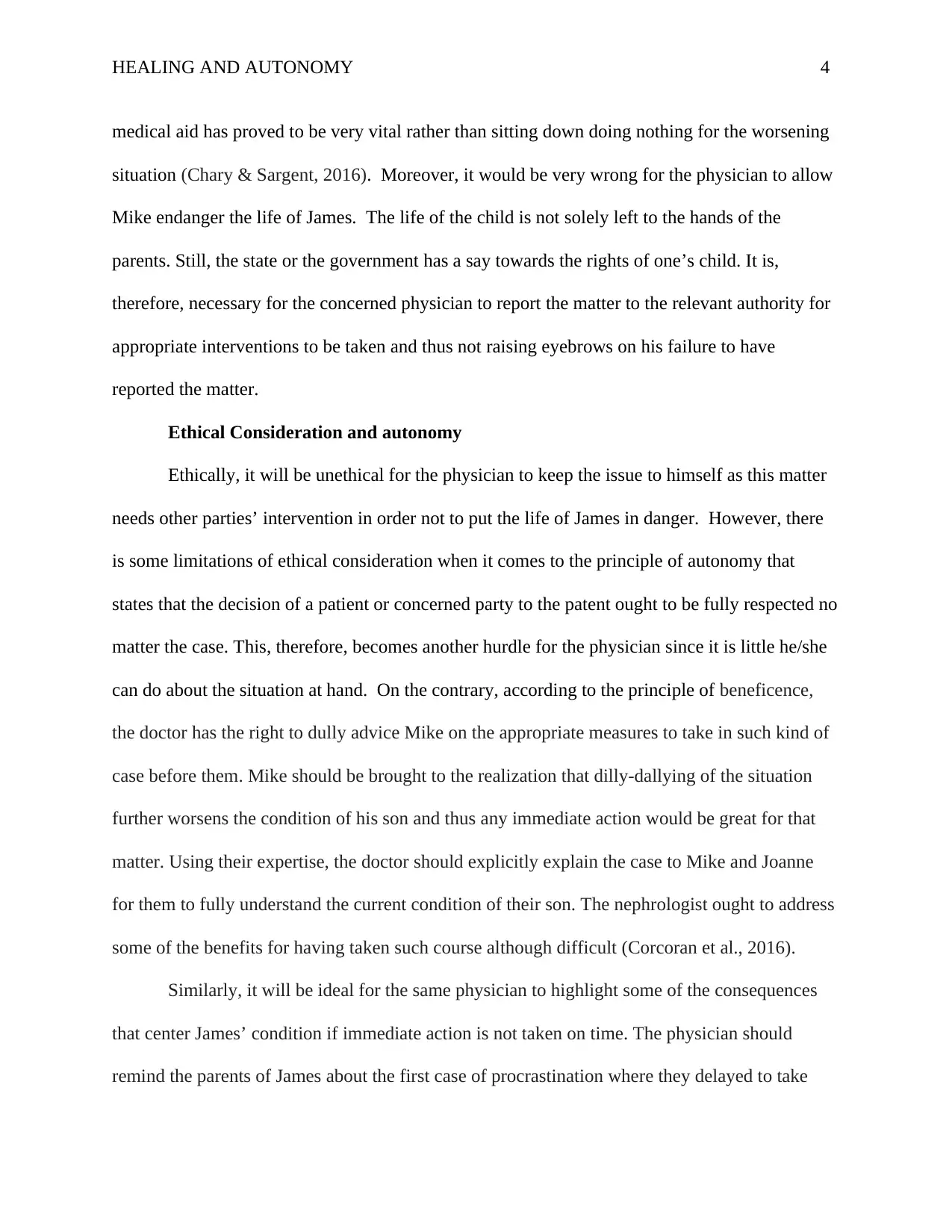
HEALING AND AUTONOMY 4
medical aid has proved to be very vital rather than sitting down doing nothing for the worsening
situation (Chary & Sargent, 2016). Moreover, it would be very wrong for the physician to allow
Mike endanger the life of James. The life of the child is not solely left to the hands of the
parents. Still, the state or the government has a say towards the rights of one’s child. It is,
therefore, necessary for the concerned physician to report the matter to the relevant authority for
appropriate interventions to be taken and thus not raising eyebrows on his failure to have
reported the matter.
Ethical Consideration and autonomy
Ethically, it will be unethical for the physician to keep the issue to himself as this matter
needs other parties’ intervention in order not to put the life of James in danger. However, there
is some limitations of ethical consideration when it comes to the principle of autonomy that
states that the decision of a patient or concerned party to the patent ought to be fully respected no
matter the case. This, therefore, becomes another hurdle for the physician since it is little he/she
can do about the situation at hand. On the contrary, according to the principle of beneficence,
the doctor has the right to dully advice Mike on the appropriate measures to take in such kind of
case before them. Mike should be brought to the realization that dilly-dallying of the situation
further worsens the condition of his son and thus any immediate action would be great for that
matter. Using their expertise, the doctor should explicitly explain the case to Mike and Joanne
for them to fully understand the current condition of their son. The nephrologist ought to address
some of the benefits for having taken such course although difficult (Corcoran et al., 2016).
Similarly, it will be ideal for the same physician to highlight some of the consequences
that center James’ condition if immediate action is not taken on time. The physician should
remind the parents of James about the first case of procrastination where they delayed to take
medical aid has proved to be very vital rather than sitting down doing nothing for the worsening
situation (Chary & Sargent, 2016). Moreover, it would be very wrong for the physician to allow
Mike endanger the life of James. The life of the child is not solely left to the hands of the
parents. Still, the state or the government has a say towards the rights of one’s child. It is,
therefore, necessary for the concerned physician to report the matter to the relevant authority for
appropriate interventions to be taken and thus not raising eyebrows on his failure to have
reported the matter.
Ethical Consideration and autonomy
Ethically, it will be unethical for the physician to keep the issue to himself as this matter
needs other parties’ intervention in order not to put the life of James in danger. However, there
is some limitations of ethical consideration when it comes to the principle of autonomy that
states that the decision of a patient or concerned party to the patent ought to be fully respected no
matter the case. This, therefore, becomes another hurdle for the physician since it is little he/she
can do about the situation at hand. On the contrary, according to the principle of beneficence,
the doctor has the right to dully advice Mike on the appropriate measures to take in such kind of
case before them. Mike should be brought to the realization that dilly-dallying of the situation
further worsens the condition of his son and thus any immediate action would be great for that
matter. Using their expertise, the doctor should explicitly explain the case to Mike and Joanne
for them to fully understand the current condition of their son. The nephrologist ought to address
some of the benefits for having taken such course although difficult (Corcoran et al., 2016).
Similarly, it will be ideal for the same physician to highlight some of the consequences
that center James’ condition if immediate action is not taken on time. The physician should
remind the parents of James about the first case of procrastination where they delayed to take
Paraphrase This Document
Need a fresh take? Get an instant paraphrase of this document with our AI Paraphraser
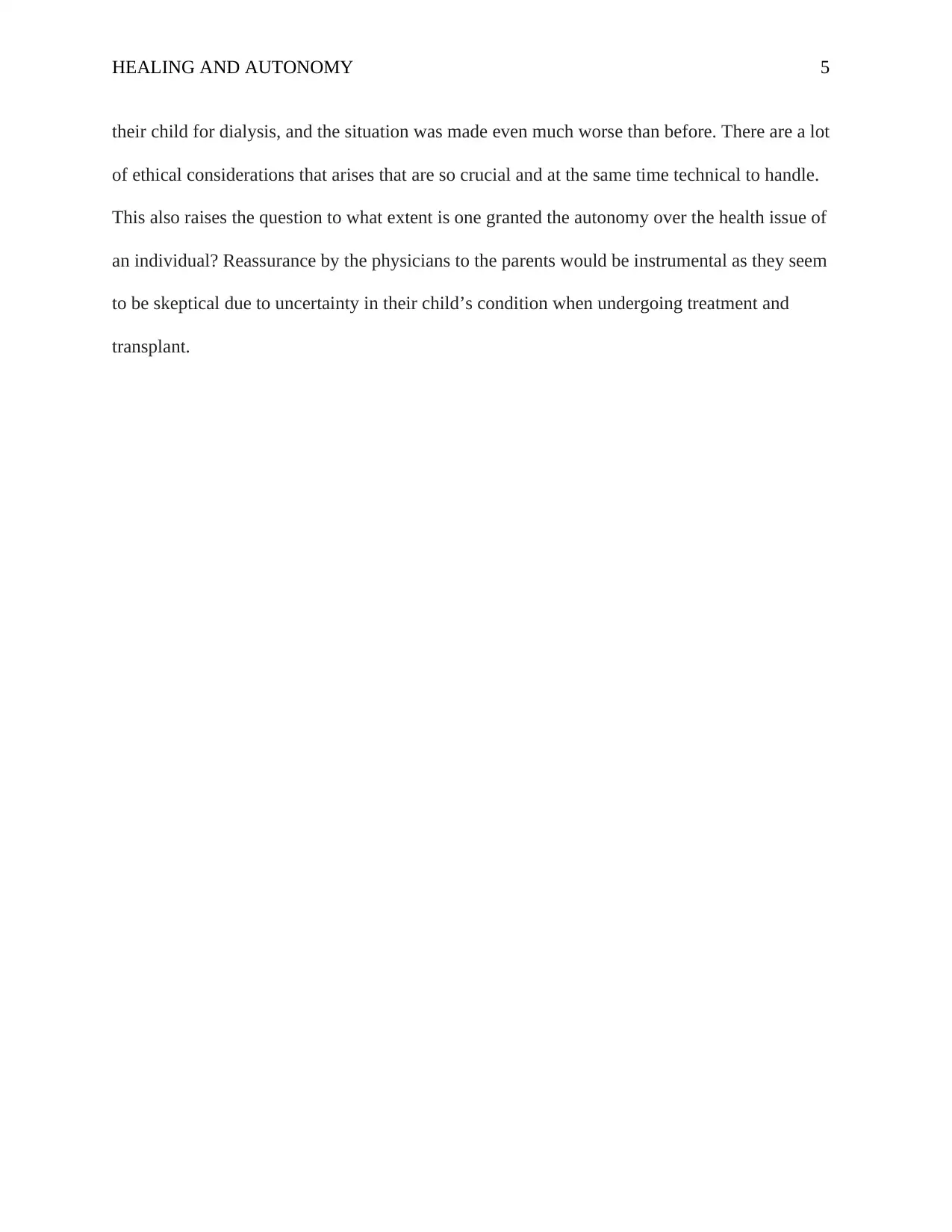
HEALING AND AUTONOMY 5
their child for dialysis, and the situation was made even much worse than before. There are a lot
of ethical considerations that arises that are so crucial and at the same time technical to handle.
This also raises the question to what extent is one granted the autonomy over the health issue of
an individual? Reassurance by the physicians to the parents would be instrumental as they seem
to be skeptical due to uncertainty in their child’s condition when undergoing treatment and
transplant.
their child for dialysis, and the situation was made even much worse than before. There are a lot
of ethical considerations that arises that are so crucial and at the same time technical to handle.
This also raises the question to what extent is one granted the autonomy over the health issue of
an individual? Reassurance by the physicians to the parents would be instrumental as they seem
to be skeptical due to uncertainty in their child’s condition when undergoing treatment and
transplant.
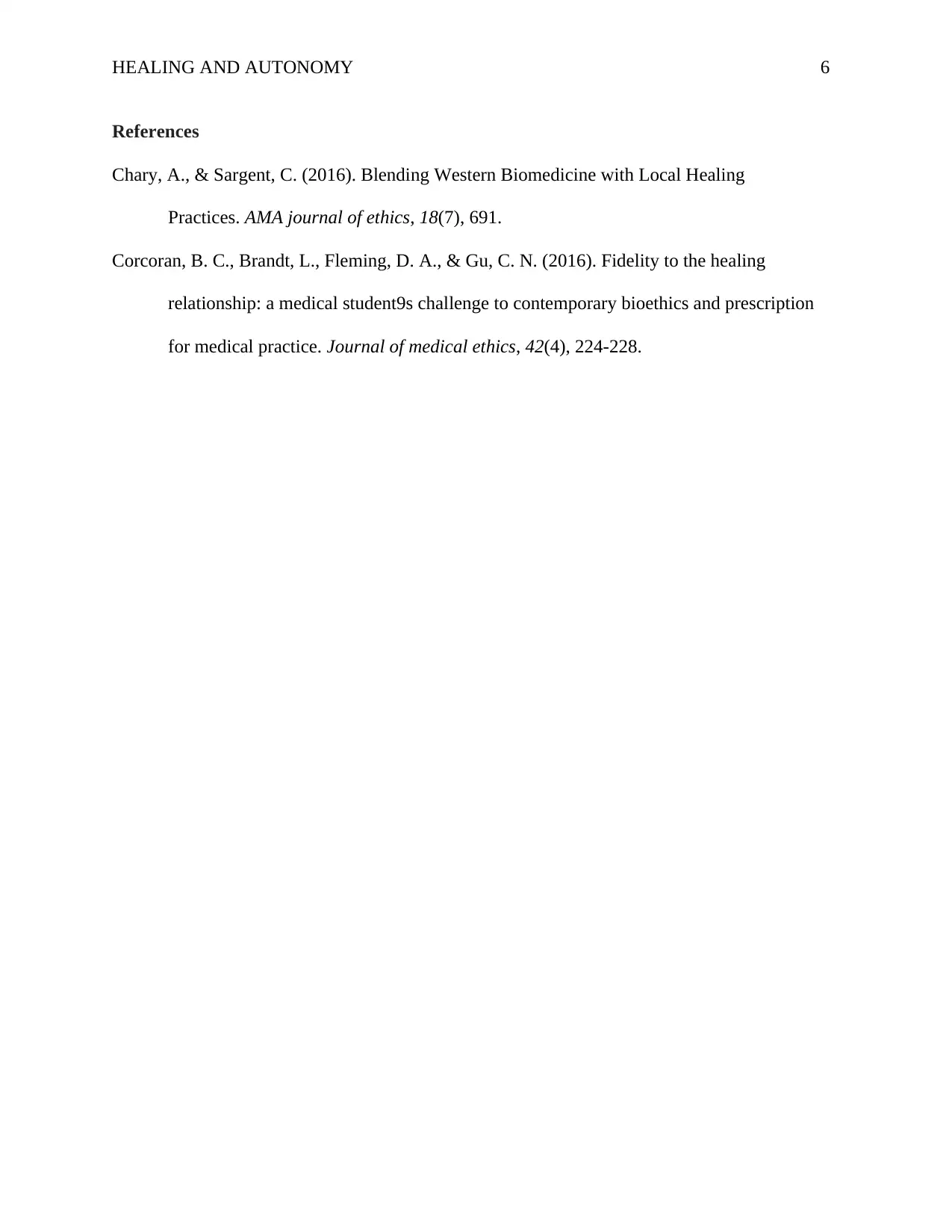
HEALING AND AUTONOMY 6
References
Chary, A., & Sargent, C. (2016). Blending Western Biomedicine with Local Healing
Practices. AMA journal of ethics, 18(7), 691.
Corcoran, B. C., Brandt, L., Fleming, D. A., & Gu, C. N. (2016). Fidelity to the healing
relationship: a medical student9s challenge to contemporary bioethics and prescription
for medical practice. Journal of medical ethics, 42(4), 224-228.
References
Chary, A., & Sargent, C. (2016). Blending Western Biomedicine with Local Healing
Practices. AMA journal of ethics, 18(7), 691.
Corcoran, B. C., Brandt, L., Fleming, D. A., & Gu, C. N. (2016). Fidelity to the healing
relationship: a medical student9s challenge to contemporary bioethics and prescription
for medical practice. Journal of medical ethics, 42(4), 224-228.
⊘ This is a preview!⊘
Do you want full access?
Subscribe today to unlock all pages.

Trusted by 1+ million students worldwide
1 out of 6
Related Documents
Your All-in-One AI-Powered Toolkit for Academic Success.
+13062052269
info@desklib.com
Available 24*7 on WhatsApp / Email
![[object Object]](/_next/static/media/star-bottom.7253800d.svg)
Unlock your academic potential
Copyright © 2020–2026 A2Z Services. All Rights Reserved. Developed and managed by ZUCOL.




